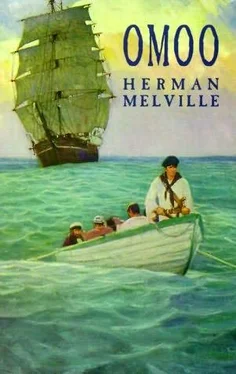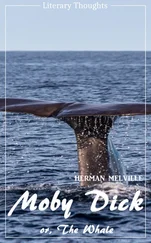Herman Melville - Omoo - Adventures in the South Seas
Здесь есть возможность читать онлайн «Herman Melville - Omoo - Adventures in the South Seas» весь текст электронной книги совершенно бесплатно (целиком полную версию без сокращений). В некоторых случаях можно слушать аудио, скачать через торрент в формате fb2 и присутствует краткое содержание. Жанр: Классическая проза, на английском языке. Описание произведения, (предисловие) а так же отзывы посетителей доступны на портале библиотеки ЛибКат.
- Название:Omoo: Adventures in the South Seas
- Автор:
- Жанр:
- Год:неизвестен
- ISBN:нет данных
- Рейтинг книги:3 / 5. Голосов: 1
-
Избранное:Добавить в избранное
- Отзывы:
-
Ваша оценка:
- 60
- 1
- 2
- 3
- 4
- 5
Omoo: Adventures in the South Seas: краткое содержание, описание и аннотация
Предлагаем к чтению аннотацию, описание, краткое содержание или предисловие (зависит от того, что написал сам автор книги «Omoo: Adventures in the South Seas»). Если вы не нашли необходимую информацию о книге — напишите в комментариях, мы постараемся отыскать её.
Omoo: Adventures in the South Seas — читать онлайн бесплатно полную книгу (весь текст) целиком
Ниже представлен текст книги, разбитый по страницам. Система сохранения места последней прочитанной страницы, позволяет с удобством читать онлайн бесплатно книгу «Omoo: Adventures in the South Seas», без необходимости каждый раз заново искать на чём Вы остановились. Поставьте закладку, и сможете в любой момент перейти на страницу, на которой закончили чтение.
Интервал:
Закладка:
But none were to be seen, except at such a distance that they looked like ants.
As evening was now at hand, my companion proposed our returning home forthwith; and then, after a sound night's rest, starting in the morning upon a good day's hunt with the whole force of the plantation.
Following another pass in descending into the valley, we passed through some nobly wooded land on the face of the mountain.
One variety of tree particularly attracted my attention. The dark mossy stem, over seventy feet high, was perfectly branchless for many feet above the ground, when it shot out in broad boughs laden with lustrous leaves of the deepest green. And all round the lower part of the trunk, thin, slab-like buttresses of bark, perfectly smooth, and radiating from a common centre, projected along the ground for at least two yards. From below, these natural props tapered upward until gradually blended with the trunk itself. There were signs of the wild cattle having sheltered themselves behind them. Zeke called this the canoe tree; as in old times it supplied the navies of the Kings of Tahiti. For canoe building, the woods is still used. Being extremely dense, and impervious to worms, it is very durable.
Emerging from the forest, when half-way down the hillside, we came upon an open space, covered with ferns and grass, over which a few lonely trees were casting long shadows in the setting sun. Here, a piece of ground some hundred feet square, covered with weeds and brambles, and sounding hollow to the tread, was inclosed by a ruinous wall of stones. Tonoi said it was an almost forgotten burial-place, of great antiquity, where no one had been interred since the islanders had been Christians. Sealed up in dry, deep vaults, many a dead heathen was lying here.
Curious to prove the old man's statement, I was anxious to get a peep at the catacombs; but hermetically overgrown with vegetation as they were, no aperture was visible.
Before gaining the level of the valley, we passed by the site of a village, near a watercourse, long since deserted. There was nothing but stone walls, and rude dismantled foundations of houses, constructed of the same material. Large trees and brushwood were growing rankly among them.
I asked Tonoi how long it was since anyone had lived here. "Me, tammaree (boy)-plenty kannaker (men) Martair," he replied. "Now, only poor pehe kannaka (fishermen) left-me born here."
Going down the valley, vegetation of every kind presented a different aspect from that of the high land.
Chief among the trees of the plain on this island is the "Ati," large and lofty, with a massive trunk, and broad, laurel-shaped leaves. The wood is splendid. In Tahiti, I was shown a narrow, polished plank fit to make a cabinet for a king. Taken from the heart of the tree, it was of a deep, rich scarlet, traced with yellow veins, and in some places clouded with hazel.
In the same grove with the regal «AH» you may see the beautiful flowering «Hotoo»; its pyramid of shining leaves diversified with numberless small, white blossoms.
Planted with trees as the valley is almost throughout its entire length, I was astonished to observe so very few which were useful to the natives: not one in a hundred was a cocoa-nut or bread-fruit tree.
But here Tonoi again enlightened me. In the sanguinary religious hostilities which ensued upon the conversion of Christianity of the first Pomaree, a war-party from Tahiti destroyed (by «girdling» the bark) entire groves of these invaluable trees. For some time afterwards they stood stark and leafless in the sun; sad monuments of the fate which befell the inhabitants of the valley.
CHAPTER LVI
MOSQUITOES
THE NIGHT following the hunting trip, Long Ghost and myself, after a valiant defence, had to fly the house on account of the mosquitoes.
And here I cannot avoid relating a story, rife among the natives, concerning the manner in which these insects were introduced upon the island.
Some years previous, a whaling captain, touching at an adjoining bay, got into difficulty with its inhabitants, and at last carried his complaint before one of the native tribunals; but receiving no satisfaction, and deeming himself aggrieved, he resolved upon taking signal revenge. One night, he towed a rotten old water-cask ashore, and left it in a neglected Taro patch where the ground was warm and moist. Hence the mosquitoes.
I tried my best to learn the name of this man; and hereby do what I can to hand it down to posterity. It was Coleman-Nathan Cole-man. The ship belonged to Nantucket.
When tormented by the mosquitoes, I found much relief in coupling the word «Coleman» with another of one syllable, and pronouncing them together energetically.
The doctor suggested a walk to the beach, where there was a long, low shed tumbling to pieces, but open lengthwise to a current of air which he thought might keep off the mosquitoes. So thither we went.
The ruin partially sheltered a relic of times gone by, which, a few days after, we examined with much curiosity. It was an old war-canoe, crumbling to dust. Being supported by the same rude blocks upon which, apparently, it had years before been hollowed out, in all probability it had never been afloat.
Outside, it seemed originally stained of a green colour, which, here and there, was now changed into a dingy purple. The prow terminated in a high, blunt beak; both sides were covered with carving; and upon the stern, was something which Long Ghost maintained to be the arms of the royal House of Pomaree. The device had an heraldic look, certainly-being two sharks with the talons of hawks clawing a knot left projecting from the wood.
The canoe was at least forty feet long, about two wide, and four deep. The upper part-consisting of narrow planks laced together with cords of sinnate-had in many places fallen off, and lay decaying upon the ground. Still, there were ample accommodations left for sleeping; and in we sprang-the doctor into the bow, and I into the stern. I soon fell asleep; but waking suddenly, cramped in every joint from my constrained posture, I thought, for an instant, that I must have been prematurely screwed down in my coffin.
Presenting my compliments to Long Ghost, I asked how it fared with him.
"Bad enough," he replied, as he tossed about in the outlandish rubbish lying in the bottom of our couch. "Pah! how these old mats smell!"
As he continued talking in this exciting strain for some time, I at last made no reply, having resumed certain mathematical reveries to induce repose. But finding the multiplication table of no avail, I summoned up a grayish image of chaos in a sort of sliding fluidity, and was just falling into a nap on the strength of it, when I heard a solitary and distinct buzz. The hour of my calamity was at hand. One blended hum, the creature darted into the canoe like a small swordfish; and I out of it.
Upon getting into the open air, to my surprise, there was Long Ghost, fanning himself wildly with an old paddle. He had just made a noiseless escape from a swarm which had attacked his own end of the canoe.
It was now proposed to try the water; so a small fishing canoe, hauled up near by, was quickly launched; and paddling a good distance off, we dropped overboard the native contrivance for an anchor-a heavy stone, attached to a cable of braided bark. At this part of the island the encircling reef was close to the shore, leaving the water within smooth, and extremely shallow.
It was a blessed thought! We knew nothing till sunrise, when the motion of our aquatic cot awakened us. I looked up, and beheld Zeke wading toward the shore, and towing us after him by the bark cable. Pointing to the reef, he told us we had had a narrow escape.
It was true enough; the water-sprites had rolled our stone out of its noose, and we had floated away.
Читать дальшеИнтервал:
Закладка:
Похожие книги на «Omoo: Adventures in the South Seas»
Представляем Вашему вниманию похожие книги на «Omoo: Adventures in the South Seas» списком для выбора. Мы отобрали схожую по названию и смыслу литературу в надежде предоставить читателям больше вариантов отыскать новые, интересные, ещё непрочитанные произведения.
Обсуждение, отзывы о книге «Omoo: Adventures in the South Seas» и просто собственные мнения читателей. Оставьте ваши комментарии, напишите, что Вы думаете о произведении, его смысле или главных героях. Укажите что конкретно понравилось, а что нет, и почему Вы так считаете.












